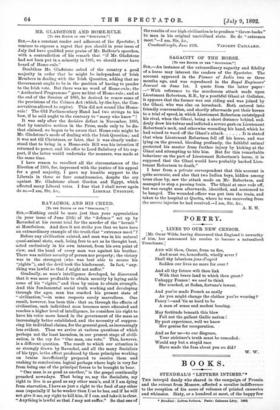MR. GLADSTONE AND HOME-RULE.
[To THE EDITOR OF THE " SPECTATOZ."1 Si,—As a constant reader and adherent of the Spectator, I venture to express a regret that you should in your issue of July 2nd have qualified your praise of Mr. Balfour's speeches, with a contradiction of his remark that "if Mr. Gladstone had not been put in a minority in 1885, we should never have heard of Home-rule."
Doubtless Mr. Gladstone asked of the country a good majority in order that he might be independent of Irish Members in dealing with the Irish Question, adding that no Government ought to be in the position of having to pander to the Irish vote. Bat there was no word of Home-rule; the "Authorised Programme" gave no hint of Howe-rule; and at the end of the Session of 1885, he desired to renew some of the provisions of the Crimes Act (which, by-the-bye, the Con- servatives allowed to expire). This did not sound like Home- rule ! The Old Parliamentary Hand had two strings to his bow, if he said aught to the contrary to "many who know " !
It was only after the decisive defeat in November, 1885, that by tentative notices in the Press, made only to be dis- that claimed, we began to be aware that Home-rule might be Mr. Gladstone's mode of dealing with the Irish Question ; and it was not till Christmas, or later, that it was clearly under- stood that to bring in a Home-rule Bill was his intention if returned to power, and his offer to Lord Salisbury of his sup- port, if the latter would undertake the measure, was made at the same time.
I have reason to recollect all the circumstances of the Election of 1885, for, impressed with the justice of his appeal for a good majority, I gave my humble support to the Liberals in three or four constituencies, despite the cry against Mr. Gladstone about Gordon and Egypt, which affected many Liberal votes. I fear that I shall never again


















































 Previous page
Previous page